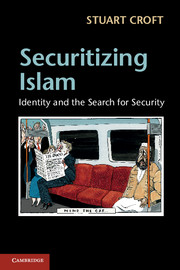Book contents
- Frontmatter
- Contents
- Figures
- Tables
- Acknowledgements
- Introduction
- 1 Ontological security and Britishness
- 2 A post-Copenhagen securitization theory
- 3 ‘Two World Wars and one World Cup’
- 4 ‘New Britishness’ and the ‘new terrorism’
- 5 The construction of ontological insecurity
- Conclusion
- Select bibliography
- Index
- References
1 - Ontological security and Britishness
Published online by Cambridge University Press: 05 June 2012
- Frontmatter
- Contents
- Figures
- Tables
- Acknowledgements
- Introduction
- 1 Ontological security and Britishness
- 2 A post-Copenhagen securitization theory
- 3 ‘Two World Wars and one World Cup’
- 4 ‘New Britishness’ and the ‘new terrorism’
- 5 The construction of ontological insecurity
- Conclusion
- Select bibliography
- Index
- References
Summary
Introduction
‘Security’ has a variety of connotations, depending upon one’s perspective; security as survival; security as power; security as well-being. Ontological security, however, focuses on the relationship between identity, narrative and security. The concept of ontological security has permeated through a variety of disciplines in the social sciences, particularly since the publication of Giddens’s Modernity and Self-Identity in 1991. Drawing originally from work in psychiatry, ontological security focuses on the nature of the security of the self. Ontological security is achieved through the creation of a series of relationships performed through everyday routines and practices. This helps individuals avoid being paralysed by deeply disturbing questions: what is life about? What happens when I die? These routines and everyday practices may involve work, the home, religion – and, for many, also relate to national identity. That is, for many who live in the United Kingdom, a firm sense of Britishness is part of the fabric of life upon which they can rely for predictability, and therefore this identity structure contributes to the ontological security of many individual British citizens.
For some authors in international relations, such as Jennifer Mitzen and Brent Steele, it is possible to scale up the theoretical insights concerning ontological security from the individual to the level of the state. These are valuable and insightful approaches, which allow a number of key propositions to be made and tested. However, this is not the route followed here. I am not arguing that Mitzen and Steele are wrong – merely that their work is a rather different branch. The focus here is on how Britishness connects with the sense of security that pervades everyday life for particular sets of individuals.
- Type
- Chapter
- Information
- Securitizing IslamIdentity and the Search for Security, pp. 17 - 72Publisher: Cambridge University PressPrint publication year: 2012



